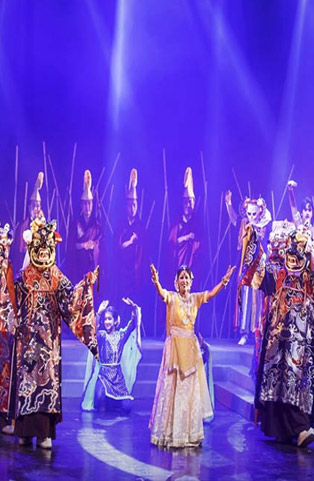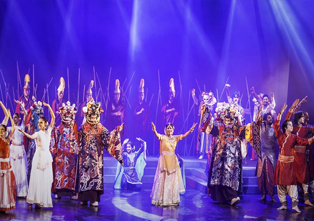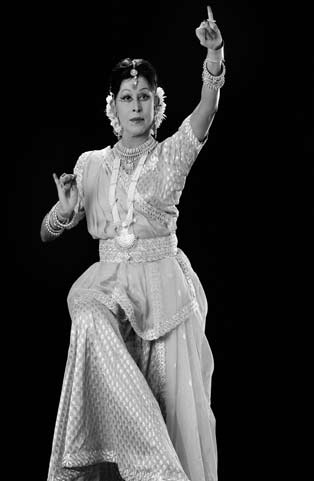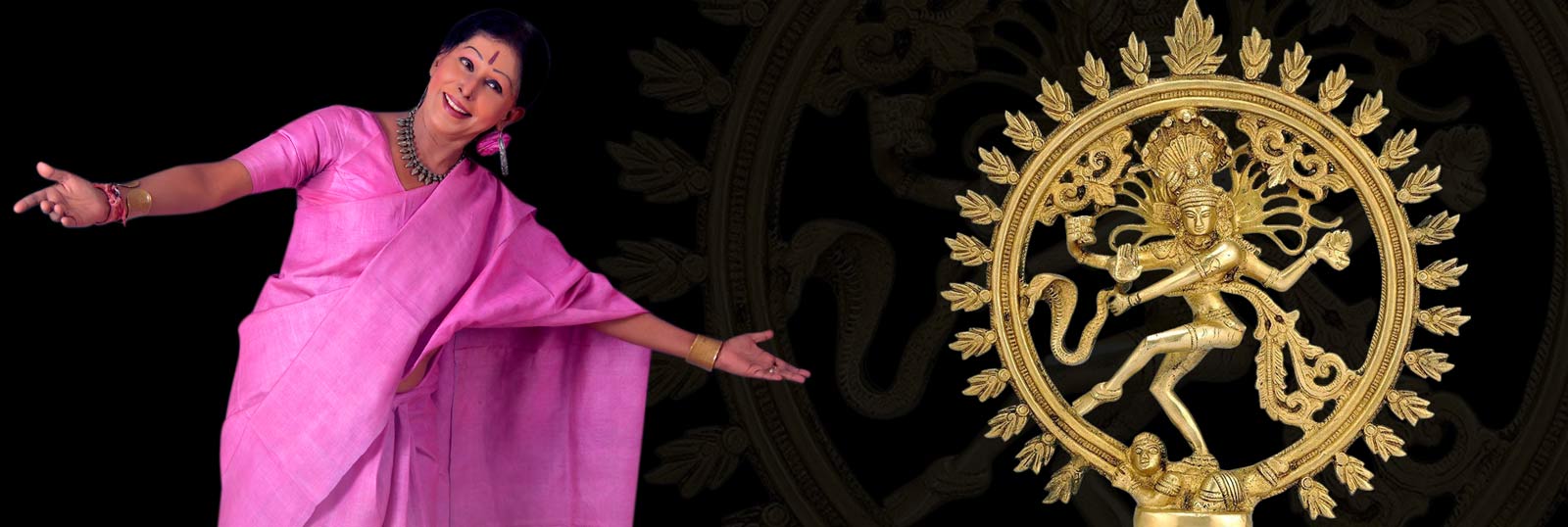"Samvedana" (1999) - special choreography based on poems of eminent Hindi literatteurs: 'Samvedana' was performed for the Memorial concert organised for Kargil War Martyrs that Shovana had organised in collaboration with artist Naresh Kapuria and Aruna Vasudeva.
In this item the feelings of time and of man, as a parent, as a soldier, as a friend, towards duty and the accompanying pain, anguish, feeling of helplessness yet tinged with the firm resolution of doing one's duty has been brought out;…for life is a constant struggle, like that of a war, and each one of us are constantly under test. Life is pulsating with rhythm and dynamism but it is also transient and therefore, being mortals, we look towards proof for everything as a mental support for enabling us to go ahead …. only to realise that we have to ultimately find peace within ourselves. The poems were taken from the works of Kunwar Narayan, Shivmangal Singh 'Suman', Ramkumar Verma, Subhadra Kumari Chauhan, Harivanshrai Bachchan and Tripti Pande.
Yearwise Summary of Items and Productions
"An Evening with Franz Schubert" (1998) Celebrating 200 years of birth of Franz Schubert, the evening saw an evening of Kathak abhinaya to four 'lieds' of Franz Schubert namely Erl Konig, Du Liebst Mich Nicht, Traenen Regen and Fruhlingssehnsucht. Parallel sentiments of traditional Kathak thumris to few 'lieds' were also performed. It was Schubert's yearning to be united with his love, the central pillar of romance that motivated him to set music to poems. Circumstances also led him to explore new avenues of music compositions. Schubert's lieder reflect the essence of Indian philosophy and Sufism, essaying the strong desire to be united with the beloved.
"The Search Within: Antar Yatra" (International Collaboration with Austrian curator Werner Dornik) In this production for the international collaborative exhibition, "The Search Within: Antar Yatra", for Shovana, it was a spiritual journey. There is implosion and explosion of ideas, of quests. For each, it is a personal journey – a journey that is not smooth. Each one is seeking something. Some may realize the ephemeral and transient nature of life, while seeking union with the divine. With the immortal poem 'Abla-pa' of late Ali Sardar Jafri providing the link, this Sufistic journey echoes the thoughts of various mystics, such as Amir Khusro, Kabir, Maulana Jalal-ud-din Rumi and lady mystics, Lal Ded (from Kashmir) and Rabia-al-Basra.
"Ugana and Vidyapati" based on verses of Mithila poet, Vidyapati Synopsis of 'Ugana': The ageing Vidyapati is deep in meditation writing and chanting verses in praise of Lord Shiva. Shiva is captivated by the sweetness of Vidyapati's verses and decides to descend on to the earth and serve Vidyapati so as to be able to hear his verses at every moment of the day. Disguised as 'Ugana', a lowly servant, he starts serving in the poet's household. One day, Vidyapati, on a long tour, is dying of thirst. The faithful servant, Ugana, tries to find water, but all his efforts are in vain. In order to save his dying master, he is forced to give him waters of the holy Ganges from his tresses. Vidyapati is revived but recognises the holy quality of the water and realises that Ugana is none other than the Lord himself. He falls at the feet of the Lord but Shiva warns Vidyapati to keep his identity a secret otherwise he would be forced to leave his side. But fate wills it otherwise! Sudhira, wife of Vidyapati, incensed by the fact that both husband and servant have nothing better to do than write and listen to poetry, takes out her anger on Ugana and beats him with a broom. Vidyapati cries out to his wife to stop beating Ugana for he is Shiva himself. True to his warning, Shiva disappears and Vidyapati is left unconsolable in his mourning.
Creative Director, Opening & Closing Ceremony of Indian Independence at National Stadium Shovana was Creative Director-producer of the Classical Dance Sequence in the Opening Ceremony of the Golden Jubilee Celebrations of Indian Independence at National Stadium 1997 in which 100 dancers of 6 classical dance styles were featured.
"Charagh-e-Dair: An Ode to Benaras" of Mirza Ghalib As in Mera Safar, the discussions on mysticism, spiritualism and secularism held between Rais Mirza, Ali Sardar Jafri and Shovana Narayan led to yet another co-production in "Charagh-e-Dair" in 1997, translated by Ali Sardar Jafri. It was the first time that the cultural world and the audience at large became aware of the Ode to Benaras by Ghalib reflecting the great catholicity of his spirit. The poem served as a reminder for the need for harmony in a time when reason seems to take a back seat and fundamentalism seems to have raised its head all over the world! The key verse where Benaras has been stated to be the "kaaba of Hindostan" was shared by Shovana with several State and central departments, including the ICCR
"Shakuntala" - a Unique Soliloquy Under the direction of Shri Arun Kuckreja, for the first time ever in classical dance of the 20th century, Shovana Narayan soliloquised Maihtili Sharan Gupt's epic work "Shakuntala" to packed houses in July 1996. With this, Shovana added yet another milestone of till hitherto untreaded path to her achievements.
"Padmavati" based on a short story by Kamala Das The great writer, Kamala Das, was delighted when Shovana expressed her desire to dance out 'Padmavati' on the experience of a devadasi and immediate permission was given.
"Sanmati": A meditation On Mahatma Gandhi's martyrdom in collaboration with Prof Ramchandra Gandhi Gandhi was killed on his way to his evening prayer meeting. His dying words were "Hey Ram", an invocation of God., something which only the rarest devotee is able to do at the moment of unexpected and violent death. What might Gandhi have said to his assassin had he some breath left before dying? Why did Gandhi not fast unto death to prevent the partition of India? What is the meaning of his martyrdom? "Sanmati", a Kathak play, is a meditation on these questions.
"Akbar's Bridge" - a telefilm on the building of the Shahi Bridge at Jaunpur across Gomti River. A period film based on an incident in 1556 in Mughal Emperor Akbar's life wherein the young Mughal ruler once ordered the construction of a bridge instead of the earlier planned mosque at Jaunpur, thus proving his commitment to serve the people. Immortalised in a poem by Rudyard Kipling, it is a testimony to the Emperor's secular credentials. In this tele-film, the moving and powerful role of Aliya who brings about the transformation in Akbar was performed to critical acclaim by Shovana!
"Trishala Nandan" - based on the life of Mahavir Jain. Performed on Mahavir Jayanti, this dance ballet featured the episodes relating to the birth of Mahavira and of major incidents in his life.
"The Clown of Assisi" based on a medieval Christian story in collaboration with Prof Ramchandra Gandhi The dance play revolves around a young orphan boy, Francis, from Assisi, who grows up to be a world famous juggler but becomes arrogant and vain. He is brought back to reform, the hard way, not long before he dies.
"Pralay ki Chhaya" by Jaishankar Prasad Based on a long poem by the great Hindi poet, Jaishankar Prasad, the poem dwells on how pride and arrogance leads to a fall.
"Dushasan Bas Karo" to a poem of Dr LM Singhvi Is there a parallel between the de-robing of Draupadi and environmental consciousness? For the first time in 1990, this unique relationship was brought out by Shovana Narayan in a unique rendition of the eminent jurist Dr LM Singhvi's poem "Dushasana Bas Karo".
Dushasana attempts to de-robe / strip Draupadi in the open royal court in an attempt to humiliate the Pandavas but Draupadi is miraculously saved by Lord Krishna. Draupadi has been symbolically likened to Mother Earth whose environmental cover is being constantly stripped and she is being 'de-robed' by greedy mankind. Who is our Lord Krishna today to deliver Mother Earth from this act?
"Raktamalin Matsarya" (to music only – inspired by Carmen) Two women, adversaries in love, clash with their supporters ending tragically. In this item, full use was made of various rhythmic patterns and formations in the fight sequence.





 Shovana Narayan
Shovana Narayan  Mob: +919711543781, +919811173734
Mob: +919711543781, +919811173734 Email :
Email :